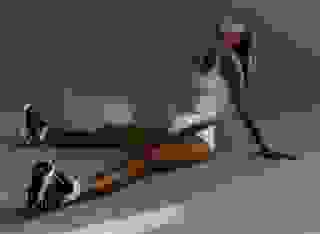- Novels and Novellas
- No Future Ch. 88
Note: You can change font size, font face, and turn on dark mode by clicking the "A" icon tab in the Story Info Box.
You can temporarily switch back to a Classic Literotica® experience during our ongoing public Beta testing. Please consider leaving feedback on issues you experience or suggest improvements.
Click hereWar
Odile
2111
There were several things that could have killed Odile. So much devastation was happening at more or less the same precise moment in time that there was an embarrassingly rich choice of lethal candidates. But whichever it was, it happened far too suddenly and with absolutely no warning for Odile to take evasive action, not that there was much she'd have been able to do anyway.
The intense blistering heat alone was more than enough to kill Odile even though the explosion's epicentre was over a kilometre away. But if it hadn't been that or the searing temperature, then the abrupt onrush of air into the suddenly opened vacuum would have dashed the life out of her as her charred body was smashed doll-like against the walls of houses that had suddenly buckled into ruins from the same unimaginable force.
It could have been the intense heat, sudden impact or even the lethal radiation that killed Odile. Like a marionette with strings cut, Odile and her freshly broken limbs were thrown back and forth against buildings and lamp-posts: a fresh spurt of blood breaking forth after each collision. If by some miracle there was still a breath of life in her this was surely extinguished when the walls of a house propelled across the street along which she'd a moment ago been walking crushed her shattered body against the walls of another and she was buried under several tons of rubble. Her skull was crushed and an arm visible through the rubble was bent into several impossible angles.
Odile didn't even see the mushroom cloud or hear the explosion. The searing heat and radiant light that instantly burnt out her retinas reached her before any associated sound. Her lover Edith was somewhat further from the epicentre of the explosion which was detonated more by navigational error than design in Lancaster's outermost suburbs where it could have been of no conceivable strategic advantage to whichever of the Americans, Scots, French or Irish military command that had launched the nuclear-tipped device towards the by-now obliterated Republic of England. But Edith's further term of life was barely a moment longer than Odile's.
Her attention was instantly drawn towards the window of the room where she'd been sitting through which burst a blinding flash of light. There was also a weird whistling that wasn't quite what she might have believed would herald the end of everything in the world that either she or Odile had ever known. Edith's eyes were scorched but as she wasn't immediately blinded, she could glimpse the rising column of smoke and dust four or five kilometres away. For Edith her the heat was more painful than terminally lethal. Her flesh wasn't so much roasted as severely singed. But Edith's demise and that of everyone else in the Lancaster town centre happened when seconds later she was caught in a maelstrom of tumbling buildings and other unexpectedly mobile street furniture from which she couldn't possibly flee as the winds rushed inwards towards the source of the explosion and flung her repeatedly and mercilessly against whatever hard object there was until, like Odile, there was no life remaining in a body that was crushed, battered, bleeding, scalded and in severe shock.
Neither Edith nor Odile ever believed it would end this way.
Probably nobody did, including the military officers who'd unleashed humanity's nuclear arsenal in one final pyrotechnic display that lit up the surface of the moon and was more than enough to bring a brightly-lit end to all that was left of human culture and civilisation. There were no doubt shelters in China, Siberia, New Zealand and the Pacific Ocean where the last remnants of the human species might survive a little while longer, but not necessarily for many more years.
It was without doubt the end for the Republic of England and for everything associated with it. There would be no more English art and culture. No more rural retreats. Those who survived were as equal as any other in their wretchedness with only ill-health and the prospect of slow death from radiation to look forward to. Their brief future history would be plagued with endless recrimination and mutual blame during which the last remnants of civilised values such as sexual and racial equality would be very much forgotten. There was no prospect of help and salvation from a scientific community that had unwittingly brought about its own destruction and that of everyone else. Perhaps survivors with a conscience such as Roland might strive to help the desperate millions, but with what resources? The future was a desperate one in which human dignity was lost forever and where the distribution of food, shelter and clothing, however compromised by disease and radiation, would be determined more by luck and bloody combat than any concept of desert or fairness.
It was strictly incorrect to say that the apocalypse had arrived without warning, although there had been a significant failure in the early-warning systems that were meant to sound moments before the weapons of mass destruction arrived. But what real use would they have been as thousands upon thousands of lethal missiles were launched all over the globe and, as an afterthought, over England? But as so few resources had been allocated to civil defence it was likely that the alarms would never have worked anyway. So much of the government's limited resources had been set aside for war-readiness, famine-relief, quarantine against plague, blighted crops, rising sea-levels, violent weather events and the impossible-to-satiate demands of the rich and powerful.
In any case, whatever mistake it was that had triggered the international exchange of every ounce of thermonuclear destructiveness the world's governments had stored over the last century and a half was almost certainly not the conscious and deliberate choice of a political or military leader. The legacy of creaky software systems and over-complicated administrative procedures was just not able to cope with a modern world that was increasingly beleaguered by mediaeval blight and where most people now lived in pre-industrial ignorance. And those who might survive now faced a future that would resemble more a prehistoric than a mediaeval past. This was the return to an age in which the human being was only one of several species of animal struggling to survive by chewing carrion and dodging predators.
This desperate future was the ultimate outcome of the fantasies of those who held the belief that humanity was somehow uniquely blessed. Perhaps they had faith in the divine providence of an elevated being with a remarkable physical likeness to the hominid male with a grand plan so obscure that no one really understood it, least of all those who most unquestioningly believed in it.
In the days before the final end, Odile and Edith had watched the news broadcasts on the television screen at the soup kitchen with the same apprehension as everyone else. Nevertheless, even in these desperate early days of international war, most of those who filed in for their daily bowl of soup would much prefer to watch a quiz show, a situation comedy or a chat show. Such entertainment was still very much available, along with the increasingly hysterical pleas for calm and restraint issued by public officials, until the arbitrary moment when the high-alert early warning system somewhere in the world—perhaps in the Republic of North America, but just as likely in Northumberland, Beijing or Aberdeen—reacted a little too presumptuously at the sight of a flock of geese or the distant echo of a small earthquake. Edith's final moments could just have easily have been as she watched the closing moments of a comedy quiz show where the laughter of the studio audience would just momentarily be punctuated by screams of panic and despair as London fell victim to a cluster of missiles directed towards it from all over the globe, of which only a few were likely to have come from England's traditional enemies: the Scots, the Welsh and the French.
Like most people, Odile had nursed the hope that all the anxiety of impending doom would soon blow over. The tense atmosphere couldn't last forever and normal life would eventually resume. Edith, however, reminded her lover that recent history didn't give much cause for optimism. The rhetoric was ratcheted up so high that it seemed increasingly unlikely that it would just fade away. How could the Scots ever forgive their southern neighbours for the insults thrown at them? Although the last few years had been characterised as the Second Cold War, the tension between the belligerent nations was becoming unpleasantly hot. At which stage would the international state of low-level aggression escalate into something much more bellicose?
The news programmes covered in interminable detail the various small-scale wars that the hostile nations of the world were conducting against each other. The Isle of Man was a particular hotspot. It was criss-crossed and scarred by deep trenches as the English peeked over the parapets towards their Scottish and Irish foes. In North America, the border states of Virginia, Minnesota and New Mexico had long been host to widely reported atrocities and massacres. And far from the gradually shrinking influence of the English-speaking world, there was warfare, border disputes, undeclared invasions and isolated lethal incidents across all the continents, although the greatest concentration was in Africa, Europe and North America.
Despite the many signs of imminent crisis, Odile's last day began no differently to any other. She and Edith had struggled out of bed with the morning free of any need to go to work. Edith stayed at home above the soup kitchen, while Odile went for a walk across Lancaster to visit another friend of hers in a part of town that only a few hours later would become nothing more than a vast smouldering crater. There was no premonition that the tatty, derelict streets lined with beggars and drug addicts would soon become scorched by the fires of hell and that every last soul would be incinerated.
Even the weather was unexceptional. It was a typical April day. Not too hot. Not too cold. A little bit drizzly and moderately overcast. None of this would have been an obstacle to the missile which either by chance or design was headed towards North West England, more likely intended to level Manchester or Liverpool than the ancient city of Lancaster. Its guidance systems knew nothing about the elements. It was travelling at just the right speed, maintaining just the right ambient temperature and deflecting sufficient electromagnetic radiation, that it wasn't detected by England's antique anti-missile defences which, despite the years of neglect and the Just-In-Time philosophy that ensured that it was only one step away from collapsing in on itself, was still able to prevent the arrival of a significant proportion of the incoming missiles, but not necessarily of their radioactivity, heat and long-term environmental legacy.
As it glided over England's hills and valleys, hugging close to the wooded hill-slopes and cleverly changing colour as it flew over England's lakes, motorways and fields of genetically modified foodstuff, it knew only the rough coordinates of its destination. But the decades since the missile was programmed and the many alterations made as the geopolitical systems shifted according to whim and political expediency, the actual target at which it its journey came to an end was almost certainly not what was intended.
Neither the missile nor the nuclear warhead whose contact with Lancashire soil would leave a churned-up long-lasting legacy of heavy metals for many hundreds of thousands of years had any emotion of affection or malice towards its target. It was nothing more than a bullet shaped device with stabilisers, a guidance system and a very crude Artificial Intelligence system that took account of potential obstacles but had no means of changing its purpose or objective once in flight. It had no notion of the history or significance of any English town or city, any more than it would have of Houston, Moscow, Johannesburg, Buenos Aires or Edinburgh. But these cities and many much smaller were all to be devastated by similar weapons of mass destruction. Many were launched from submarines whose propellers churned up the last few corpses at the bottom of the jelly-fish infested oceans now long depleted of fish, whales and coral. Many flew from the sky. Some were launched from the robot-staffed military bases on the moon that brought the last vestiges of humanity's space adventure on missiles back towards the home planet and from whence the whirring automatons could observe humanity's demise with no risk to themselves. Many were launched from silos in deserts, often where jungles and lakes once used to be, destined to leave the entire planet in a state of desertification as much like the Sahara, Arizona or the Gobi as it was possible to be.
Along with Lancaster Castle, the shopping centre, the historic monuments and a millennium of English history; along with Odile and Edith, their shared love and life together; along with the unpredictable and various hopes, fears and anxieties of the ragged undernourished people of Lancaster; the whole of England and English history arrived quite suddenly and abruptly to a very absolute and unmistakable full stop.
- COMMENTS
usa's 200 military bases around the world when the usa collapsed what happened to the bases they used for running drugs guns sex trafficking - all the missiles?








